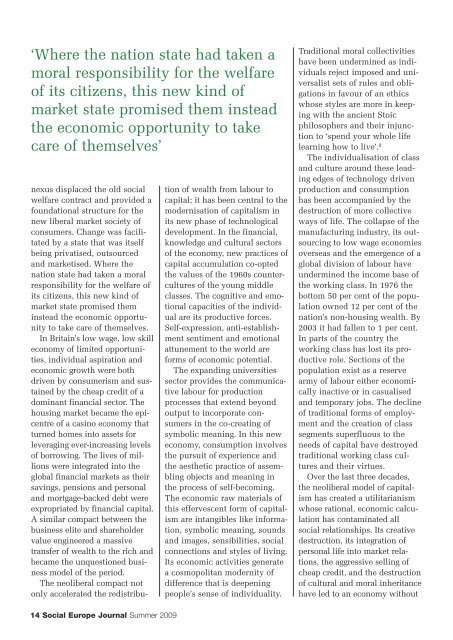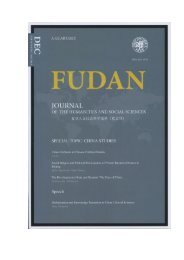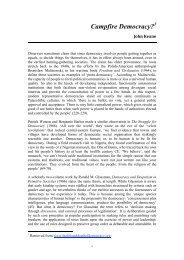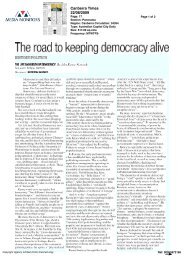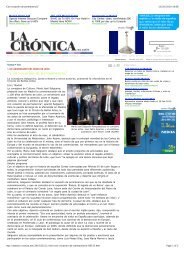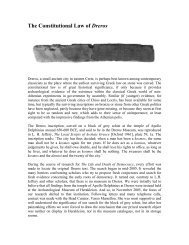The Ethics of Capitalism - Social Europe Journal
The Ethics of Capitalism - Social Europe Journal
The Ethics of Capitalism - Social Europe Journal
Create successful ePaper yourself
Turn your PDF publications into a flip-book with our unique Google optimized e-Paper software.
‘Where the nation state had taken a<br />
moral responsibility for the welfare<br />
<strong>of</strong> its citizens, this new kind <strong>of</strong><br />
market state promised them instead<br />
the economic opportunity to take<br />
care <strong>of</strong> themselves’<br />
nexus displaced the old social<br />
welfare contract and provided a<br />
foundational structure for the<br />
new liberal market society <strong>of</strong><br />
consumers. Change was facilitated<br />
by a state that was itself<br />
being privatised, outsourced<br />
and marketised. Where the<br />
nation state had taken a moral<br />
responsibility for the welfare <strong>of</strong><br />
its citizens, this new kind <strong>of</strong><br />
market state promised them<br />
instead the economic opportunity<br />
to take care <strong>of</strong> themselves.<br />
In Britain’s low wage, low skill<br />
economy <strong>of</strong> limited opportunities,<br />
individual aspiration and<br />
economic growth were both<br />
driven by consumerism and sustained<br />
by the cheap credit <strong>of</strong> a<br />
dominant financial sector. <strong>The</strong><br />
housing market became the epicentre<br />
<strong>of</strong> a casino economy that<br />
turned homes into assets for<br />
leveraging ever-increasing levels<br />
<strong>of</strong> borrowing. <strong>The</strong> lives <strong>of</strong> millions<br />
were integrated into the<br />
global financial markets as their<br />
savings, pensions and personal<br />
and mortgage-backed debt were<br />
expropriated by financial capital.<br />
A similar compact between the<br />
business elite and shareholder<br />
value engineered a massive<br />
transfer <strong>of</strong> wealth to the rich and<br />
became the unquestioned business<br />
model <strong>of</strong> the period.<br />
<strong>The</strong> neoliberal compact not<br />
only accelerated the redistribu-<br />
tion <strong>of</strong> wealth from labour to<br />
capital; it has been central to the<br />
modernisation <strong>of</strong> capitalism in<br />
its new phase <strong>of</strong> technological<br />
development. In the financial,<br />
knowledge and cultural sectors<br />
<strong>of</strong> the economy, new practices <strong>of</strong><br />
capital accumulation co-opted<br />
the values <strong>of</strong> the 1960s countercultures<br />
<strong>of</strong> the young middle<br />
classes. <strong>The</strong> cognitive and emotional<br />
capacities <strong>of</strong> the individual<br />
are its productive forces.<br />
Self-expression, anti-establishment<br />
sentiment and emotional<br />
attunement to the world are<br />
forms <strong>of</strong> economic potential.<br />
<strong>The</strong> expanding universities<br />
sector provides the communicative<br />
labour for production<br />
processes that extend beyond<br />
output to incorporate consumers<br />
in the co-creating <strong>of</strong><br />
symbolic meaning. In this new<br />
economy, consumption involves<br />
the pursuit <strong>of</strong> experience and<br />
the aesthetic practice <strong>of</strong> assembling<br />
objects and meaning in<br />
the process <strong>of</strong> self-becoming.<br />
<strong>The</strong> economic raw materials <strong>of</strong><br />
this effervescent form <strong>of</strong> capitalism<br />
are intangibles like information,<br />
symbolic meaning, sounds<br />
and images, sensibilities, social<br />
connections and styles <strong>of</strong> living.<br />
Its economic activities generate<br />
a cosmopolitan modernity <strong>of</strong><br />
difference that is deepening<br />
people’s sense <strong>of</strong> individuality.<br />
Traditional moral collectivities<br />
have been undermined as individuals<br />
reject imposed and universalist<br />
sets <strong>of</strong> rules and obligations<br />
in favour <strong>of</strong> an ethics<br />
whose styles are more in keeping<br />
with the ancient Stoic<br />
philosophers and their injunction<br />
to ‘spend your whole life<br />
learning how to live’. 2<br />
<strong>The</strong> individualisation <strong>of</strong> class<br />
and culture around these leading<br />
edges <strong>of</strong> technology driven<br />
production and consumption<br />
has been accompanied by the<br />
destruction <strong>of</strong> more collective<br />
ways <strong>of</strong> life. <strong>The</strong> collapse <strong>of</strong> the<br />
manufacturing industry, its outsourcing<br />
to low wage economies<br />
overseas and the emergence <strong>of</strong> a<br />
global division <strong>of</strong> labour have<br />
undermined the income base <strong>of</strong><br />
the working class. In 1976 the<br />
bottom 50 per cent <strong>of</strong> the population<br />
owned 12 per cent <strong>of</strong> the<br />
nation's non-housing wealth. By<br />
2003 it had fallen to 1 per cent.<br />
In parts <strong>of</strong> the country the<br />
working class has lost its productive<br />
role. Sections <strong>of</strong> the<br />
population exist as a reserve<br />
army <strong>of</strong> labour either economically<br />
inactive or in casualised<br />
and temporary jobs. <strong>The</strong> decline<br />
<strong>of</strong> traditional forms <strong>of</strong> employment<br />
and the creation <strong>of</strong> class<br />
segments superfluous to the<br />
needs <strong>of</strong> capital have destroyed<br />
traditional working class cultures<br />
and their virtues.<br />
Over the last three decades,<br />
the neoliberal model <strong>of</strong> capitalism<br />
has created a utilitarianism<br />
whose rational, economic calculation<br />
has contaminated all<br />
social relationships. Its creative<br />
destruction, its integration <strong>of</strong><br />
personal life into market relations,<br />
the aggressive selling <strong>of</strong><br />
cheap credit, and the destruction<br />
<strong>of</strong> cultural and moral inheritance<br />
have led to an economy without<br />
14 <strong>Social</strong> <strong>Europe</strong> <strong>Journal</strong> Summer 2009


